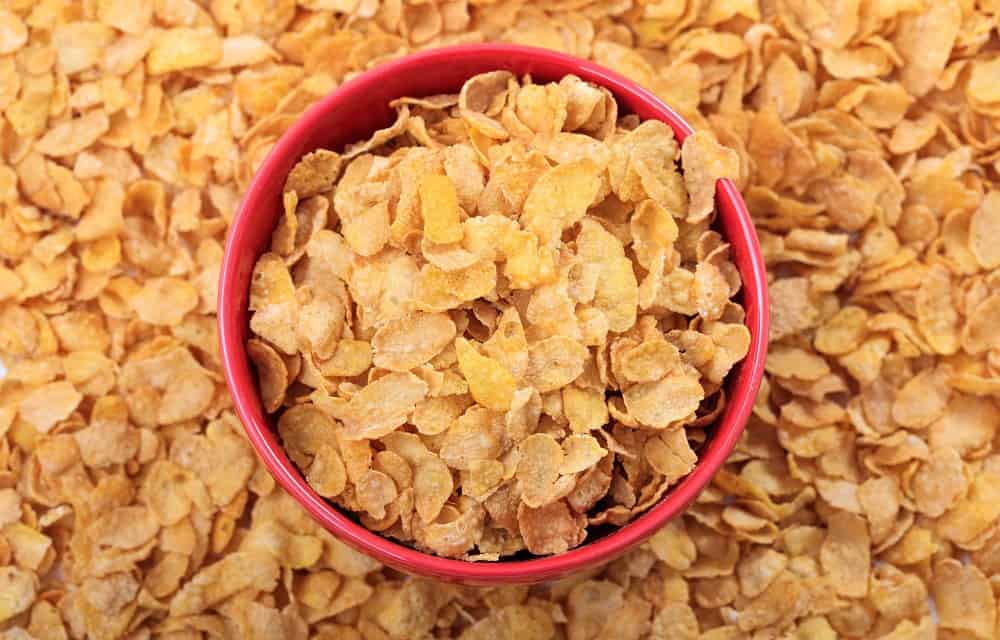Corn Flakes are a pillar in the breakfast cereal sector as it is one of the oldest cereals in the market. First created in 1894 by William Kellogg (1), the founder of the Kellogg Company (AKA Kellogg’s), Corn Flakes were historically developed for William’s brother John Kellogg as he was looking for a healthy food item for his patients at the health resort he was working at. Aside from being among the top cereal brands in the world, Corn Flakes has been integrated into many dishes and recipes.
Only a few ingredients are required to create Kellogg’s Corn Flakes and all of them are predominantly vegan. However, some vegans might take issue with sugar as the ingredient is commonly debated in the vegan community as to whether it is vegan or not.
Additionally, Corn Flakes fall into the issue that most breakfast cereals do – they are fortified with vitamins, including vitamin D3. Although vitamin D3 is an important nutrient, it is widely accepted that most vitamin D currently produced for commercial use is derived from sheep’s wool. Thus, it is unlikely that Kellogg’s Corn Flakes is vegan with vitamin D3.
Table of Contents
Are Corn Flakes Vegan?

Kellogg’s Corn Flakes, like many vitamin-fortified cereal brands, are unlikely to be vegan. Disregarding that the cereal brand also contains sugar which is a commonly debated ingredient in the vegan community, the issue of veganism in Corn Flakes is something else.
The issue regarding Corn Flakes is that Kellogg’s fortified it with vitamin D3 just like most vitamin-fortified breakfast cereals. Due to the popularity of cereal brands being conventionally consumed by children, cereal companies fortify their cereal products to make them more nutritious. Although cereals are naturally healthy, they lean more towards being fiber-rich instead of being nutrient-dense. Thus, vitamin fortification makes cereal brands even more nutritious and appealing to parents who want to provide the necessary vitamins and minerals to their children.
Unfortunately, Kellogg’s Corn Flakes is also fortified with vitamin D3 which is an active form of vitamin D. While most vitamins can be synthesized or produced biotechnologically, forms of vitamin D3 are mostly commercially producing using an animal product – sheep’s wool. Producing vitamin D includes taking a cholesterol from sheep wool grease and then later converting it into an active form of vitamin D such as vitamin D3.
Corn Flakes Ingredients List
The list of ingredients of Kellogg’s Corn Flakes includes (2): milled corn, sugar, malt flavor, contains 2% of salt.
Vitamins and minerals: iron (ferric phosphate), niacinamide, vitamin B6 (pyridoxine hydrochloride), vitamin B2 (riboflavin), vitamin B1 (thiamin hydrochloride), folic acid, vitamin D3, vitamin B12.
Evident from the limited ingredients listed above, Corn Flakes are produced with very simple ingredients. In fact, the ingredients listed are all typically considered vegan except for sugar which is considered a gray area ingredient which means some vegans might be okay with it while other vegans avoid it.
Sugar
Sugar is a common sweetener and is a major ingredient in Kellogg’s Corn Flakes. In fact, sugar is a key ingredient that makes Kellogg’s Corn Flakes what it is because, in the early years, William Kellogg wanted to add sugar while John Kellogg wanted the cereal to remain bland. This disagreement led to William Kellogg proceeding on his own and founding the Kellogg Company as it is known today.
Although sugar is typically derived from a plant source such as sugarcane and sugar beets, it is a highly debated food item as it can become non-vegan depending on how it is produced.
After extracting sugar from sugarcane or sugar beets, sugar companies often further refine their sugar to make it more appealing to consumers. Additional refinement processes can make the sugar whiter and finer. One such process included in further refinement includes filtration.
Different sugar companies have different methods of filtration such as the use of granulated carbon. However, some companies use bone char – the charred skeletal remains of various animals (3). Although bone char serves as an excellent filter, it is undoubtedly an animal product. Thus, sugar that has been processed with bone char cannot be considered vegan.
The problem with the use of bone char is that not all companies do this. Thus, it takes a little effort to determine which companies use this process or not. Matters are further complicated when large food companies can have multiple sources for raw ingredients such as sugar. This means that the sugar they use in their food products can come from different sugar companies, all using different processing methods. This is why sugar is commonly considered as a gray area ingredient because it is difficult to determine if whether it is truly vegan or not.
Fortunately, vegans in other parts of the world are not too concerned with this issue because the practice of using bone char is more common in the US specifically.
Vitamin D
To function properly, the body needs a wide range of nutrients. Vitamins are micronutrients that the body only needs in trace amounts, unlike macronutrients (carbohydrates, fats, and lipids) that must be eaten in large quantities. While all vitamins are important for good health, vegans pay special attention to vitamin D.
Vitamin D, unlike other vitamins, can be synthesized by the human body. A chemical cascade occurs as a result of the sun's UV radiation, which transforms a cholesterol in the skin into vitamin D. Although it can be synthesized through its unique photobiology, vitamin D can also be obtained via the diet, just like other vitamins.
The issue with vitamin D and veganism is that the vitamin's development has long been known to necessitate the use of animal products. Vitamin D has traditionally been extracted from animal brains, spinal cords, and livers. Sheep's wool is now the most cost-effective source of vitamin D. Industries derive a specific type of cholesterol from sheep wool grease, which is then converted into active forms of vitamin D such as vitamin D3 (4).
There have been advances in the processing of vitamin D that do not require the use of animals. Some businesses, for example, are looking into synthetic manufacturing. On the other hand, there have been reports of lichen being used in biotechnological vitamin D processing.
Despite these efforts, it should not be forgotten that sheep's wool is believed to be responsible for the majority of commercial vitamin D production. As a result, vitamin D-fortified products such as Kellogg’s Corn Flakes are unlikely to be truly vegan.
References




